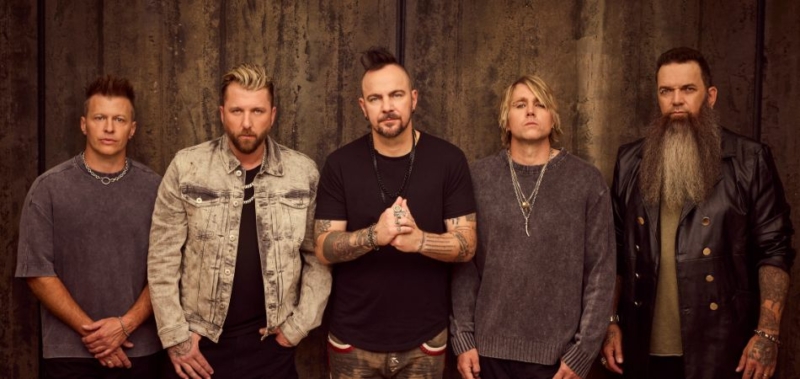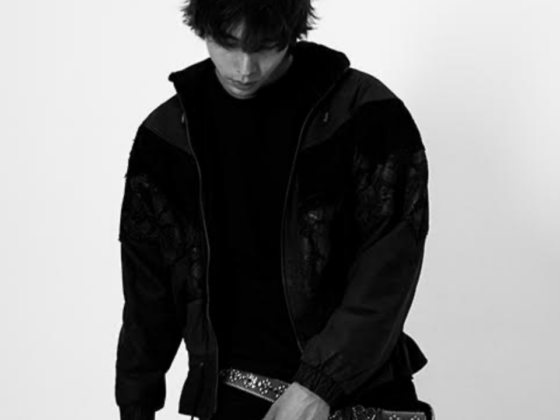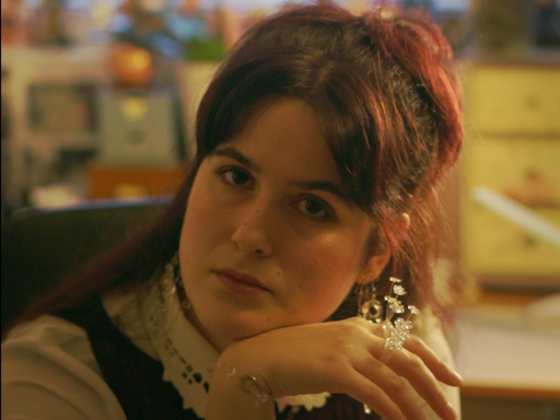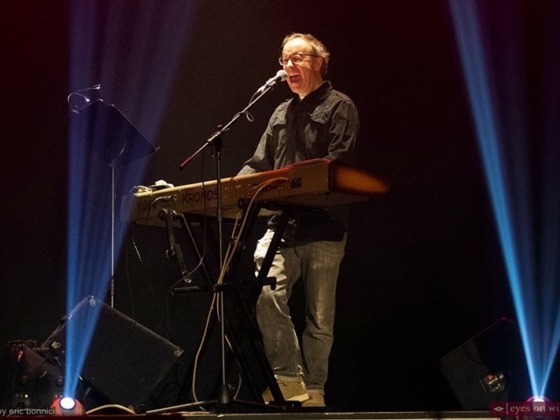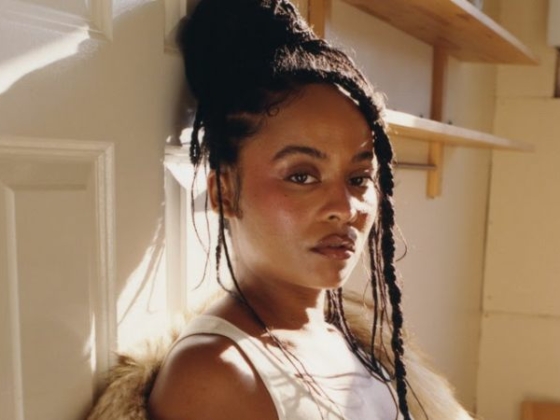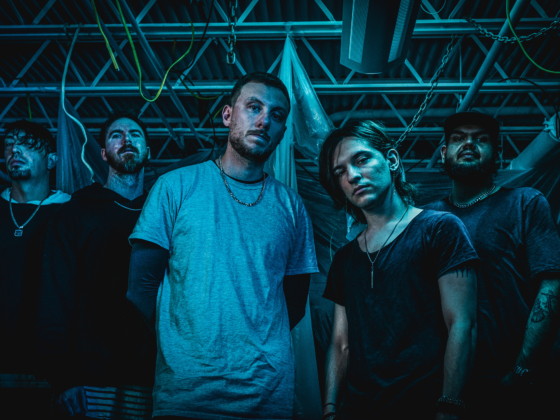Rock giants Three Days Grace have returned with their eighth studio album, Alienation.
The twelve-track project is more than just a reunion with original frontman Adam Gontier—it’s a declaration that digs into the many sides of isolation and what can emerge from it.
Having dominated the early 2000s with hits like “I Hate Everything About You” and “Animal I Have Become,” Three Days Grace has faced plenty of internal changes over the years.
Still, they’ve kept pushing forward—approaching their music-making process with the same energy as a group of friends coming back together to create.
Alienation acts as a powerful body of work that stays true to Three Days Grace’s signature sound while feeling revitalized with modern touches, thanks to producers Zakk Cervini, Howard Benson, and Dan Lancaster.
On Monday, August 18, 2025, frontmen Adam Gontier and Matt Walst spoke about the album, their excitement for this new chapter, and even some lighter topics—like their favorite go-to tour snack. Let's dive in.
With the album titled Alienation, where did the name come from? Did it shape the album, or did the songs come first and influence the title?
Adam Gontier: Yeah, the songs came first for sure, and "Alienation" is one of the songs on the album. Yeah, I think with this band there's always been sort of a common theme, like from One-X and just about sort of feeling alone, you know, surrounded by people or in any situation.
I think a lot of people can sort of relate to that, just feeling isolated, maybe, and that was again sort of a theme on this album that we wrote about, especially with the song “Alienation." It just kind of goes along with that.
"Dominate" is such a kick-a** opener. What was the inspiration behind that track, and did you always know it would be the opener?
Matt Walst: Yeah, that day we just wanted to write an anthem for, you know, sports or like a workout.
We went to Scotland a few years ago, and we played a show there, and between every song they had a chant: "here ye, here ye, here ye". So I took that and I was like that'd be great to put in a song because it was just such a great chant. Then I had my chance, I was like, oh, let's try this, and everybody liked it, so it made the cut. It's really powerful.
Most of the songs are emotionally charged. Which tracks were the most intense for you to write or record, and why?
Adam Gontier: The song “In Waves” on the album, that song specifically is about the loss of somebody important in your life and how it's really tough to let them go, and you tend to hear their voice in certain situations, or you know, get signs from that person, that kind of thing.
I'm pretty close to that one, but we've always written that way, where they're all pretty personal.
We try to dig really deep when it comes to lyrics, you know?
Matt Walst: Yeah, I think the song “Deathwish,” it kind of reminds me of when I was going a little crazy and not really caring about what was going to happen the next day, just like living in the moment, probably back when I was sponsored by Jägermeister.
Having worked with producers like Zakk Cervini, Howard Benson, and Dan Lancaster, how did they shape the sound or approach of Alienation? Were there any studio moments that pushed or surprised you creatively?
Adam Gontier: Yeah, I think there was a lot. Bringing in Dan Lancaster, which was kind of different for this band, just because his vibe is a little bit more poppy, sort of outside of the norm from what we'd normally write.
So he brought a lot of different elements and things that we probably normally wouldn't have thought of. Then we worked with Howard on vocals. We both have worked with Howard Benson a lot, and we're pretty comfortable with him.
So yeah, I think all the producers kind of brought their own thing.
Matt Walst: Zach and Dan are just so talented at making modern music. It's interesting to watch them work, and yeah, just so fast. It's so much different today, so much faster, and they can throw together something in the computer that just sounds amazing.
Adam Gontier: Where back in the day, we didn't really have that. You'd have to press record on a four-track or whatever, and you'd lay down the idea.
Matt Walst: Well, even with Zach, we’d be like, “Okay, we need a bridge,” and he’d say, “I already got it. I have these notes written down.” And I’d be like, “Wow, when did you write that?” and he’d go, “I don’t know—like two minutes ago.” He’s super talented.
Looking back, how does Alienation connect to your earlier work? Does it feel like a continuation, a break, or something entirely different?
It's kind of meshed. Yeah, it's new, it's modern. But it also goes back to those records and adds elements of those records and elements of the newer records.
Adam Gontier: I don't think we really thought about anything we wanted to do differently. It just kind of came out.
We just wanted to make sure that we, like Matt said, just had some of the feel from the early stuff that I was on, and the newer stuff. But almost modernize it. Yeah, just kind of get the right mix. It just kind of happened.
Both of your vocals blend seamlessly, but each carries a raw, gritty edge. What vocal warm-ups or unusual techniques do you swear by to get into that vocal space before recording or performing? I know, jokingly, Matt, you said that in the beginning of "Mayday," you kind of channeled Marge Simpson and the devil to kind of get there.
Adam Gontier: This guy does.
Matt Walst: He doesn't do much, really. He'll sing a little bit before the shows.
Adam Gontier: Yeah, Matt's a little better with the warm-up. Like, I should warm up more, but yeah, I don't warm up that often. I mean, sometimes I do, I'll just play a song here and there. Like a couple. That's before a show. But for the studio, I didn't really do much. I mean, Matt warms up. He does it right; he does it properly.
Matt Walst: Oh, all sorts of stuff—lip trills, and I have a vocal coach I’ve worked with for years. Just a bunch of different, weird sounds that warm up your voice.
Adam Gontier: When we were working on the very first album back in 2001, I guess it was; we were recording the demos at EMI Canada and before, if I was having a problem with my voice when we were trying to track the demo, our producer at the time, Gavin, would tell me to go downstairs, have a cigarette, a Jamaican beef patty, and an Orangina.
That's right, I did it once, brought them all back, and drank, ate, and then laid down a great track. So that became kind of a habit for me. I didn't go down before every take or anything. But it was just one of those things, like if I was struggling in the studio, I'd just go down and beef patty, cigarette, and an Orangina and do the trick. It was just a mental thing.
With this release, what are you most excited for fans to hear or feel, and what do you want them to take away from listening?
Matt Walst: Just like always, we want people to be able to apply their life to the song and be able to use it to get through dark times. That's the biggest reward when people come up to us and say this song saved me, this song got me through this time, this song got me through the loss of my parents.
Yeah, it's those kinds of things that make us like, okay, we're actually doing something right, we're helping people get through dark times.
Do you have any final thoughts you’d like to share about the album?
Adam Gontier: I know from a band point of view, we all feel like it's one of the best albums that we've done. I think it's because of everything, like the last ten years or whatever, coming together. There was a lot of stuff to write about, a lot of things we wanted to sort of accomplish, and I think we did. So we're all just really, really stoked about it.
What were you hoping to accomplish?
Adam Gontier: Well, I guess kind of the stuff that we talked about. The fact that we were both singing on this album was something that, you know, how are we going to do it? How are we going to approach this? Who's going to sing what? You know, all that stuff.
Bringing in Howard Benson to help us with that was big, so we wanted to make sure that we accomplished that.
Like, we're both singing on every song on the album, and we wanted to make sure we did that properly and the vibe we wanted to make sure it had, like we said, some of the early elements as well as new stuff. Yeah, I think we're all feeling pretty good.
-Before we wrapped up, we switched gears for a quick rapid-fire round.-
What was the first album you ever bought—and do you still listen to it?
Adam Gontier: ACDC, Back in Black, and yes. Not very often, but yes.
Matt Walst: Yeah, Faith No More. I can't remember what the album was called, but it had a bunch of dead cows on it. Yeah, the meat locker inside of it. It's a good record
What’s one word your bandmates would use to describe you (and would you agree with it)?
Adam Gontier: That’s a tough one. Awesome
Matt Walst: I agree with it, yeah. A little neurotic.
If Alienation had a mascot, what would it be and why?
Adam Gontier: He'd be the guy on fire.
Matt Walst: Yeah, I was just going to say, he'd be the little animated guy running around.
What’s your favorite city to perform in—and what makes it stand out?
Matt Walst: When did we play in Florida? That was awesome, Daytona Beach. We were right on the beach. It was awesome. I like performing shows by the beach.
Adam Gontier: Yeah, it's a tough one. I mean, we played Brazil many years ago, and Rio, the Rock in Rio site there, that was pretty amazing. Yeah, that was probably, so far, I don't know, we went to Australia two years ago and did a few shows there.
We went with Nickelback. They did like four shows in all the big cities, but yeah, probably Brazil.
What’s your favorite meal to eat on tour?
Matt Walst: Pizza.
Adam Gontier: Yeah, same.
What are you most excited about for the upcoming tour?
Adam Gontier: Pizza? No. Yeah, it's going to be a great tour.
We're going out with Breaking Benjamin, and we've gone out with those guys a lot, and the tours are always great. It's just going to be playing some of these new songs for me, playing some of these new songs live, and meeting some fans and stuff

